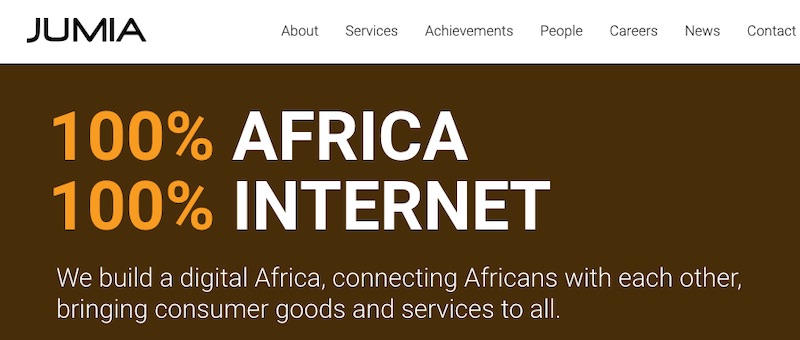
Jumia operates an online marketplace in 14 African countries. It went public in April, raising $196 million.
Some prominent ecommerce initial public stock offerings occurred in the second quarter of 2019. In this post, I’ll address three of them.
Jumia
Known as the Amazon of Africa, Jumia was founded in 2012. It operates an online marketplace in 14 African countries. It went public in April, raising $196 million. On its opening day, the stock, initially priced at $14.50 a share, closed up 75 percent.
In May a law firm filed a class action lawsuit against Jumia. On July 8, an additional three law firms initiated similar lawsuits. According to the complaints, Jumia made false and misleading statements to the public. Jumia supposedly overstated both the number of its active merchants and active customers. The complaints also alleged that the company’s statements about orders, cancellations, undelivered orders, and returned orders were not factual and overstated sales.
Nevertheless, because of strong first-quarter growth, the stock continues to increase in value, closing at $25.98 a share on July 8, indicating that not everyone is taking the lawsuits too seriously.
In the first quarter of 2019, Jumia achieved gross merchandise volume growth of 58 percent and a 102-percent increase in revenue. In March 2019, Mastercard became an investor in Jumia and formed a strategic alliance.
Jumia is the first Africa-focused start-up to launch on the New York Stock Exchange or any major global exchange. While it does business in Africa, its founders are two French former employees of McKinsey & Company, the international consulting firm. Jumia is incorporated in Germany, and its tech employees are in Portugal.
Revolve
Revolve, a Los Angeles-based ecommerce clothing merchant that relies on influencer marketing, had its initial public offering on June 7 at $18 per share. Trading on the NYSE, the company raised $212 million. Shares showed a 94-percent increase in the first day of trading, rising to almost $35 a share, giving the company a market capitalization of $1.47 billion. On July 8, shares closed at $37.30. Revolve generated $31 million in profit on $499 million in sales in 2018.
The company has an extreme dual-class stock arrangement. Class A stock shares carry one vote each while the Class B stock shares have 10 votes each. Co-CEOs Michael Mente and Mike Karanikolas will together own about 68 percent of the Class B shares. In total, Class B shareholders will control 98 percent of the stock, leaving only 2 percent for the public Class A stock.
Only a quarter of the Class A shares issued in the IPO were sold by the company, according to the filing. Investors sold the remaining shares.
In its prospectus, Revolve stated:
The dual class structure of our common stock will have the effect of concentrating voting control with our executive officers, directors and their affiliates, and it may depress the trading price of our Class A common stock.
Furthermore, Revolve said it has never paid any cash dividends and doesn’t intend to “in the foreseeable future.”
Additionally, Revolve reported in the prospectus that it had “identified material weakness” in 2017 in its financial reporting controls. The company stated that it had inadequate resources to perform a satisfactory review of its financial information. “While we continue to implement our remediation plan, we cannot assure you we will address the underlying causes of the material weakness or that we will not identify other control deficiencies,” the company advised.
With dual-class stock, lack of dividends, and inadequate financial reviews, Revolve would not seem to be a particularly attractive investment for the general public. Nonetheless, the stock price has remained steady.
Chewy
Chewy, a purveyor of pet food, went public on June 14 with an opening price of $22, raising $1 billion. It closed at $34.99 on that day. On July 8, the stock closed at $44.40. Following the IPO, PetSmart — which purchased Chewy in 2017 — owns about 70 percent of the company’s common stock and holds approximately 77 percent of the voting power.
In 2018, Chewy reported revenue of $3.5 billion, an increase of 67 percent from the prior year. However, it had a net loss of $268 million. About 42 percent of revenue comes from sales of pet food. It also sells pet drugs, toys, and supplies.
On July 9, a number of analysts issued their first reports on Chewy. Some are cautious about growth prospects because Chewy’s main competitor is Amazon. For auto-ship recurring orders, Amazon’s prices are lower than Chewy’s, according to Wedbush Securities, an investment firm.
Chewy will presumably have to compete on offerings that Amazon doesn’t have. Chewy has a higher growth rate than Amazon in the pet food category, but its cost for customer acquisition will likely rise. And its margins will be challenged.




